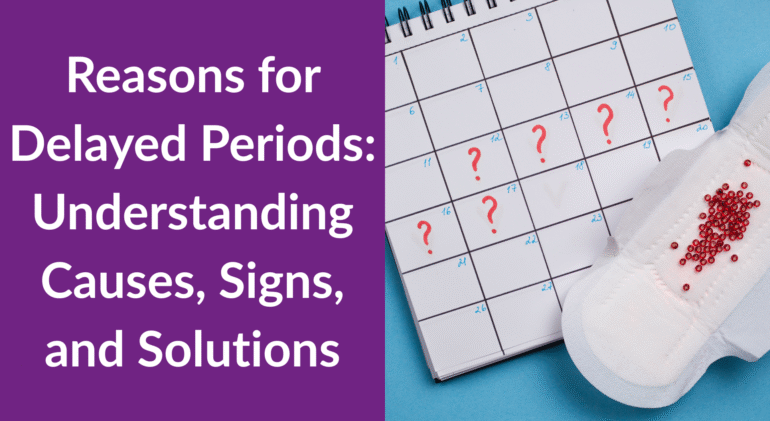
Reasons for Delayed Periods: Understanding Causes, Signs, and Solutions
Delayed periods can cause anxiety and confusion, especially when pregnancy isn’t a factor. While menstrual cycles typically range from 21 to 35 days, occasional deviations are common. However, consistent delays could signal underlying issues that merit attention.
Common Reasons for Delayed Periods

Pregnancy
Pregnancy remains the most common cause of delayed periods. If you’re sexually active and your period is late, taking a home pregnancy test should be your first step.
Hormonal Imbalances
- PCOS (Polycystic Ovary Syndrome): Elevated androgen levels disrupt ovulation, leading to irregular or missed periods.
- Thyroid Disorders: Both hyperthyroidism and hypothyroidism affect hormone regulation, causing menstrual irregularities.
- Primary Ovarian Insufficiency (POI): Early ovarian function loss can lead to irregular or absent menstruation.
Stress and Emotional Health
High stress elevates cortisol levels, interfering with hormonal signals from the brain, often delaying menstruation.
Weight Fluctuations
- Extreme Weight Loss: Rapid weight reduction through strict dieting or intense exercise can disrupt hormone production.
- Obesity: Excess body fat increases estrogen levels, potentially delaying or disrupting menstrual cycles.
Lifestyle Factors
- Excessive Exercise: Vigorous physical activities, especially among athletes, can halt periods.
- Poor Sleep or Travel: Frequent changes in sleep patterns or traveling across time zones affect hormonal balance.
Medications and Birth Control
- Hormonal contraceptives (pills, implants, IUDs) commonly alter menstrual cycles.
- Other medications such as antidepressants, antipsychotics, or chemotherapy drugs can also cause delays.
Signs of Period Coming Late (Not Pregnant)

Understanding your body’s signals can reduce anxiety. Common signs include:
- Breast tenderness or swelling
- Abdominal bloating or cramps
- Mood swings or irritability
- Acne breakouts
- Fatigue
- Changes in appetite
These premenstrual symptoms, even if delayed, typically indicate that your period is on its way.
How Much Delay in Periods Is Normal?
A delay of up to seven days occasionally is generally normal. However, consistent delays of more than a week, or cycles regularly exceeding 35 days, should prompt a consultation with your healthcare provider. Tracking your cycles can help identify patterns and determine if medical advice is needed.
How to Get Periods Immediately if Delayed?
While it’s essential to address underlying causes medically, certain methods might help induce periods naturally:
- Dietary Adjustments: Foods rich in vitamin C, ginger, turmeric, and papaya are believed to stimulate menstruation.
- Herbal Teas: Ginger tea or cinnamon tea can potentially help regulate your cycle.
- Stress Management: Yoga, meditation, and relaxation techniques reduce stress-induced hormonal disruptions.
- Warm Compresses and Baths: Heat relaxes muscles and can trigger menstrual flow if your period is imminent but delayed.
Always consult your healthcare provider before trying remedies, especially if you have existing health conditions.
When Should You Seek Medical Attention?
Consider consulting a healthcare provider if:
- You’ve missed periods for three consecutive months and pregnancy is ruled out.
- You experience severe pain, heavy bleeding, or unusual discharge.
- Your cycles become progressively irregular or very inconsistent.
- You’re experiencing symptoms like excessive hair growth, unexplained weight changes, or extreme fatigue.
Diagnosis Basics
A healthcare provider may recommend:
- Pregnancy test (first step in secondary amenorrhea).
- Blood tests: FSH, LH, TSH, prolactin, and androgen levels.
- Imaging: Pelvic ultrasound, MRI for structural or pituitary issues.
- Special tests: Endometrial biopsy or hysteroscopy if indicated by bleeding patterns
Treatment Options
- Lifestyle adjustments: Stress management, balanced diet, moderate exercise, sleep optimization.
- Hormonal therapy: Birth control pills, patch, HRT, or treatment for PCOS/thyroid.
- Medications: Metformin for insulin resistance, thyroid meds, or specific hormonal regulators.
- Surgery/procedures: Cyst removal, fibroid treatments, Asherman’s adhesiolysis.
Optimize Your Menstrual Health

| Tip | Why It Helps |
| Track cycles & symptoms | Patterns help identify triggers |
| Manage stress | Reduce cortisol, normalize hormone signaling |
| Maintain healthy weight | Supports stable ovulation |
| Moderate training | Prevent functional hypothalamic amenorrhea |
| Time labs/tests | To cover hormones, thyroid, and imaging |
Final Thoughts
Delayed periods are commonly encountered and often harmless. However, frequent or prolonged delays could indicate deeper issues that deserve medical attention. Understanding your body, managing stress, and maintaining a balanced lifestyle are key to supporting regular menstrual health.






